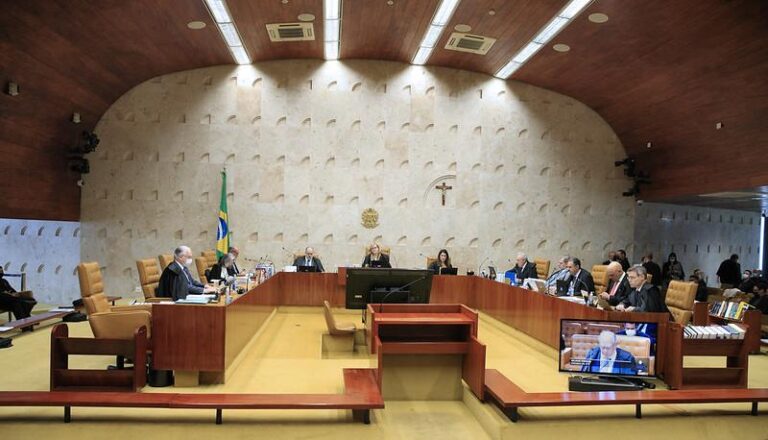In a significant development that has captured international attention, a Justice of Brazil’s Supreme Federal Court has ordered former President Jair Bolsonaro to remain under house arrest. The decision marks a pivotal moment in the ongoing legal challenges surrounding Bolsonaro, whose tenure and post-presidency actions have been the subject of intense scrutiny. This latest ruling underscores the deepening political and judicial turmoil in Brazil, raising questions about the future implications for the country’s democracy and its polarized society.
Brazil Supreme Court Justice Imposes House Arrest on Former President Bolsonaro
In a decisive move, Brazil’s Supreme Court justice has maintained the house arrest order on former President Jair Bolsonaro, further intensifying the judicial scrutiny around his tenure and actions. This unprecedented restriction comes amid ongoing investigations into allegations of corruption and misuse of public resources during Bolsonaro’s presidency. Legal experts note that the ruling underscores the judiciary’s commitment to upholding accountability, even for high-profile political figures. Bolsonaro, who has consistently denied all allegations, remains confined to his residence while his legal team prepares for the next phase of the appeal process.
Key details regarding the conditions and implications of this judicial decision include:
- Restriction Scope: Confined to residence, with limited permissions for essential activities.
- Legal Basis: Preventive measure amidst evidence indicating potential interference with investigations.
- Next Steps: Appeals hearings scheduled in the coming weeks with continued judicial oversight.
| Aspect | Details |
|---|---|
| Duration | Indefinite, pending trial progress |
| Restrictions | No public appearances, limited visitors |
| Impact | Political turmoil and international attention |
Legal Implications and Political Fallout from Bolsonaro’s Detention
The decision to keep former President Jair Bolsonaro under house arrest marks a pivotal moment in Brazil’s judiciary, underscoring the Supreme Court’s commitment to holding political figures accountable. Legal experts emphasize that this move sets a precedent for judicial intervention in cases involving national security and alleged threats to democratic institutions. Critics argue this measure reflects heightened political tensions and may influence ongoing investigations related to misinformation campaigns and alleged attempts to undermine electoral processes.
Key legal and political ramifications include:
- Potential acceleration of corruption and conspiracy probes linked to Bolsonaro’s inner circle.
- Heightened scrutiny on the balance of power between the judiciary and executive branches.
- Increased polarization within Brazilian society, potentially impacting upcoming elections.
- International attention on Brazil’s rule of law and democratic resilience.
| Aspect | Impact |
|---|---|
| Judicial Authority | Strengthened role in political accountability |
| Political Climate | Deepened societal divisions |
| Upcoming Elections | Uncertain influence on voter sentiment |
| International Perception | Focus on Brazil’s democratic institutions |
Recommendations for U.S. and International Observers on Brazil’s Judicial Actions
As international observers focus on Brazil’s evolving judicial landscape, it is crucial to uphold principles of transparency and fairness. Observers should prioritize independent monitoring of legal proceedings, ensuring that due process rights are respected and that political considerations do not overshadow judicial decisions. U.S. and global entities can facilitate this by providing technical support to strengthen institutional checks and balances within Brazil’s judiciary, promoting accountability without interfering in the sovereign legal framework.
Furthermore, diplomatic engagement can be enhanced by adopting a consistent stance on the rule of law across all cases, without exceptions. It is recommended to:
- Encourage open dialogue between Brazilian authorities and international legal experts.
- Support human rights organizations documenting judicial conduct and its effects on democratic governance.
- Monitor developments through regular reporting to ensure decisions align with Brazil’s constitutional mandates.
| Recommendation | Purpose |
|---|---|
| Independent Legal Observations | Ensure impartial evaluation of judicial actions |
| Technical Assistance | Support judiciary capacity building |
| Consistent Rule of Law Messaging | Avoid politicization of legal processes |
| Documentation & Reporting | Maintain transparency for public trust |
Key Takeaways
As the situation continues to develop, Brazil’s Supreme Court decision to keep former President Jair Bolsonaro under house arrest marks a significant moment in the nation’s ongoing political and judicial discourse. Observers both within Brazil and internationally will be closely monitoring the implications of this ruling on the country’s democratic institutions and the broader regional stability. Further updates are expected as legal proceedings progress and Bolsonaro’s political future remains uncertain.




